Sip, share, grow: How cafes are making mental health more approachable
Writer: Zhang Yu | Editor: Zhang Zhiqing | From: Original | Updated: 2025-04-15
Today’s fast-paced lifestyle is putting immense pressure on individuals, leading to a rise in mental health concerns.
The White Paper on the Mental Health of Urban Residents in China paints a stark picture: 73.6% of urban dwellers surveyed are experiencing mental sub-health, while 10.3% are struggling with psychological problems of varying severity.
In major cities such as Beijing, Shanghai, and Shenzhen, a growing trend is reshaping the landscape of mental well-being: the emergence of cafes that offer psychological counseling services.
These cafes are not just about lattes and espressos; they provide a welcoming space where individuals can engage in meaningful conversations about their mental health, often with trained professionals, in a more relaxed and less intimidating environment than traditional therapy settings.
‘Everyone is a psychologist’
While exploring the vibrant art district of OCT-LOFT in Nanshan, one might catch sight of an eye-catching billboard advertising a cafe with a name that piques curiosity: “Psychologist Cafe,” as it is literally translated from Chinese.
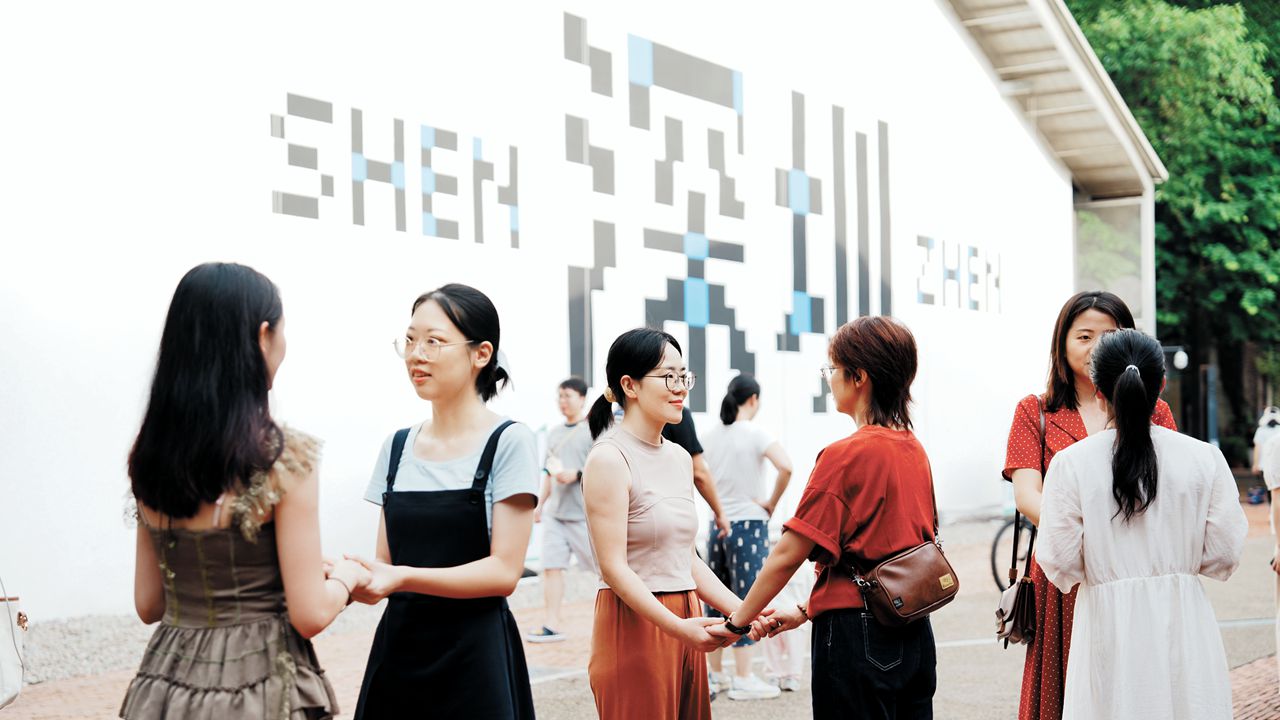
Participants look at each other in the eyes during a mutual gazing event organized by Temple of Love, a cafe offering psychological counseling services, in Shenzhen in August 2024. Photos courtesy of the cafe
The cafe itself is spacious and inviting. It offers a sanctuary of sorts, a place where the focus is as much on mental well-being as it is on the quality of the coffee. The interior is thoughtfully designed, with comfortable seating arrangements and a carefully curated selection of books on psychology.
The cafe’s founder Li Min, a psychological counselor and a coffee lover, explained that the cafe, whose English name is “Temple of Love,” was opened in July 2024. The concept behind the cafe is both simple and profound: to empower individuals to become their own psychologists.
“Our intention is not to assert our authority nor to dictate what has happened to you. Rather, we believe that everyone possesses the capacity to be their own psychologist, with the ability and right to understand their own experiences, to delve into their own hearts, and to speak about their feelings,” said Li.
“Coffee, in here, acts as a bridge that connects people in a familiar and casual urban setting. We seek a vibrant and lively space where we can gather and share, free from the formality and seriousness of more traditional settings,” he added.
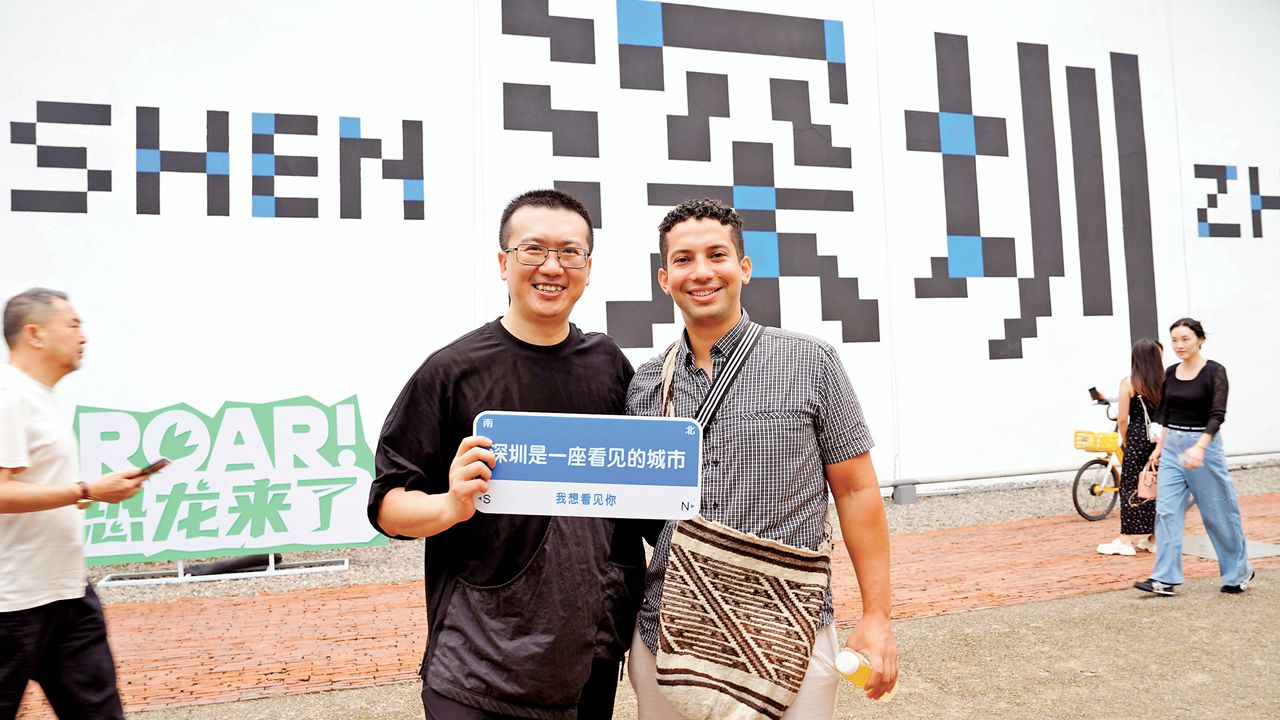
Li Min (L), founder of Temple of Love, and an expat participant pose for a photo after a mutual gazing event organized by the cafe in Shenzhen in August 2024.
According to Li, he made a significant career change at the age of 36, leaving his previous stable job to immerse himself in the study of psychology. His motivation for this shift was rooted in a deep-seated interest in understanding the complexities of human relationships, particularly the nuances of social interactions in the workplace and family dynamics.
Gradually, he came up with an idea of fostering a community where individuals could engage in mutual learning and communication, so as to facilitate personal development and growth.
This cafe, which evolved from this community, is managed by four key members. Other members have actively contributed to the space’s development.
Gao Yingying, a psychological counselor who helps manage the cafe, noted that in addition to psychological counseling, the cafe regularly hosts a variety of activities, including livestreams, salons, and training camps, designed to foster community interaction and personal growth.
Since opening, the cafe has been developing steadily, attracting patrons from across the country and even some expats living in the city, according to Gao.
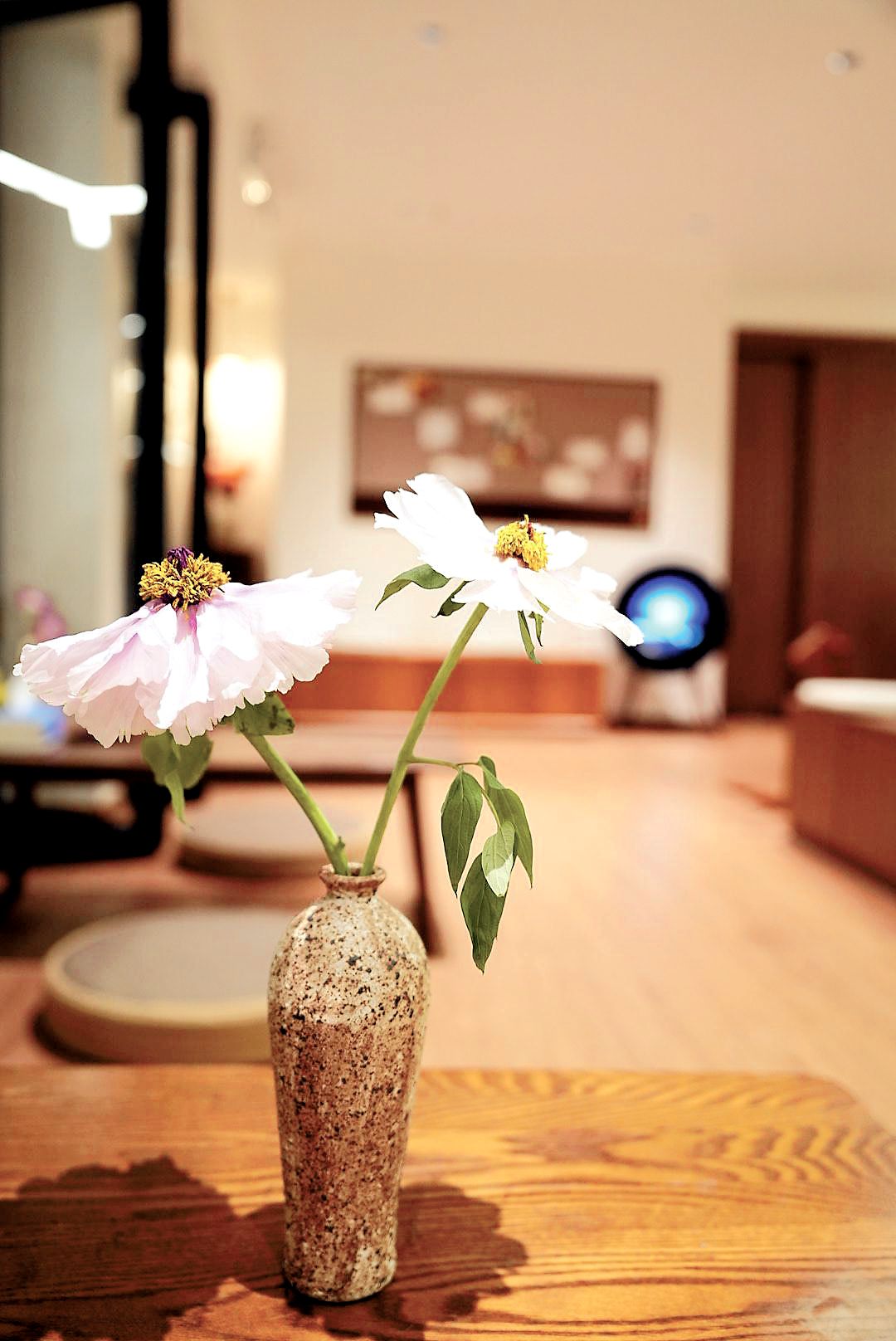
A corner of Temple of Love, a cafe offering psychological counseling services in Nanshan District.
Some patrons have hailed the cafe as a place where one can be seen, accepted, and welcomed. “If you feel lost or down, come here. It can give you a lot of warmth,” He Qian, a patron, said.
However, there are also doubts and questions. At the front door of the cafe, ta negative comment received online is posted — It says that the cafe is just using coffee and psychological counseling as a gimmick. In response to this, Li said they are open to doubts and criticism.
“The overwhelming majority of people who visit us have provided positive feedback. However, we have also publicly displayed a negative review at the front door. I think it is quite beneficial, as it serves as a reminder for us to pursue better communication and self-expression,” he said.
A place for connection
Through online searches, one can find multiple coffee shops in Shenzhen offering psychological counseling services. Beyond cafes, there exist diverse spaces that also provide mental health care, such as tea houses and bookstores.
One of the reasons why these cafes and spaces are popular lies in that by being accessible and approachable, they normalize conversations about mental health while also catering to both psychological well-being and social needs.
For customers, these cafes provide a space for immediate support or advice in a moment of need, whether it’s through informal chats or structured counseling sessions. The casual setting allows for relaxation and enjoyment, with the therapeutic atmosphere of a cafe enhancing the overall experience.

Participants pose for a group photo after a free training for future psychological consultants at Temple of Love in Nanshan District in September 2024.
Customers can also access mental health education and workshops that empower them with knowledge. Moreover, these cafes serve as a networking hub where individuals with similar experiences can meet and foster a support network.
According to Li, amidst social evolution, modernization, and the prevalent sense of interpersonal alienation, there is this collective longing for deeper interpersonal relationships.
“We’ve created a space where we can gather, be it for a simple cup of coffee and a friendly hello or to delve into deeper conversations that spark connections and light up moments in our lives,” said Li.
“Either way, I’m deeply grateful for the wonderful times we’ve shared and the beautiful moments we’ve illuminated together,” he added.
Rising need for mental health care
Over the past few years, there has been a significant increase in the registration volume of psychological counseling-related enterprises in China, a trend that mirrors the growing demand for mental health care in the country.
According to data from Chinese big data service provider Qcc.com, in 2024, the total number of registered psychological counseling-related enterprises in China increased by 28.1% year on year to 17,400. Shanghai, Shenzhen, Guangzhou, and Beijing ranked as the top four cities in terms of the number of such enterprises.
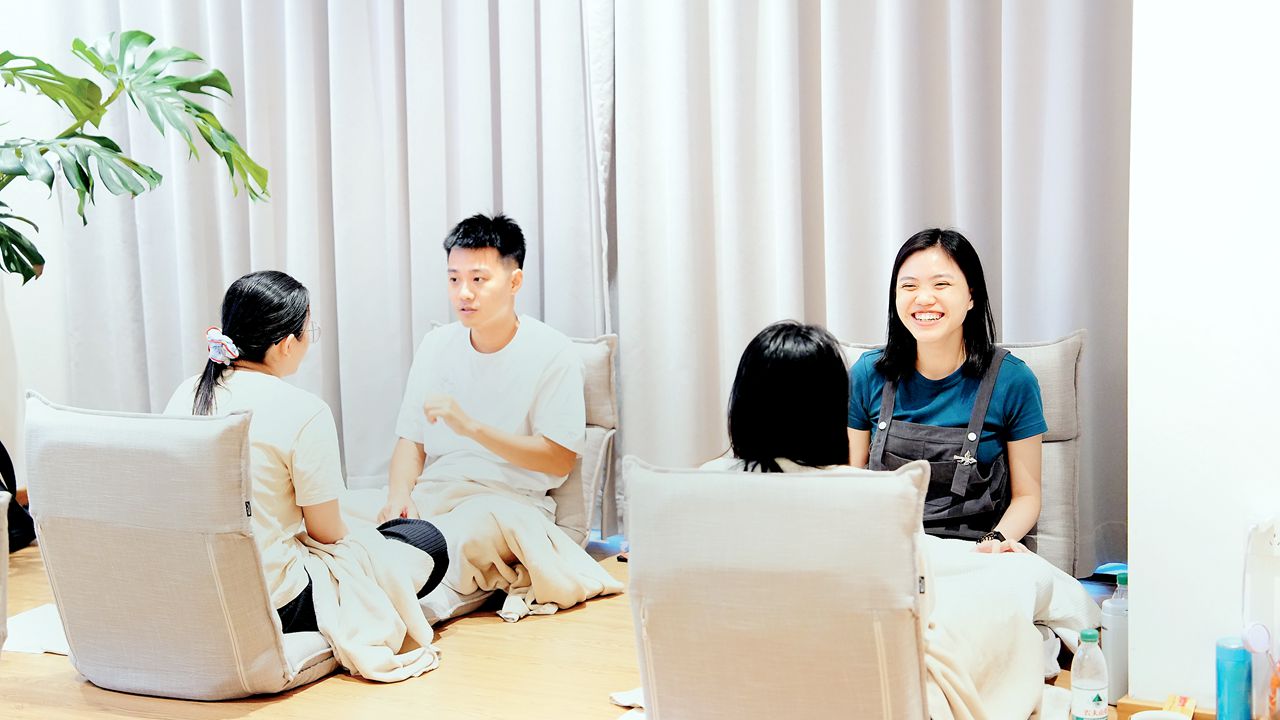
Participants interact with each other during a psychological class at Temple of Love in October 2024.
When confronting mental health issues, Gao advocated for a dual approach to address the psychological challenges faced by modern urbanites: enhancing self-awareness and altering thinking patterns.
“Firstly, cultivating sufficient attention space for self-reflection is crucial,” Gao said. This can be achieved through practices such as meditation, which helps in clearing the inner space, or by seeking guidance from a psychological counselor or coach. These methods enable individuals to gain a deeper understanding of their internal world.
“Secondly, transforming one’s thinking patterns is essential in resolving psychological problems,” she shared. For instance, when navigating the trade-off between love and career, it’s beneficial to adopt a perspective that embraces the possibility of enjoying both a beautiful love life and successful career rather than fixating on a single aspect.
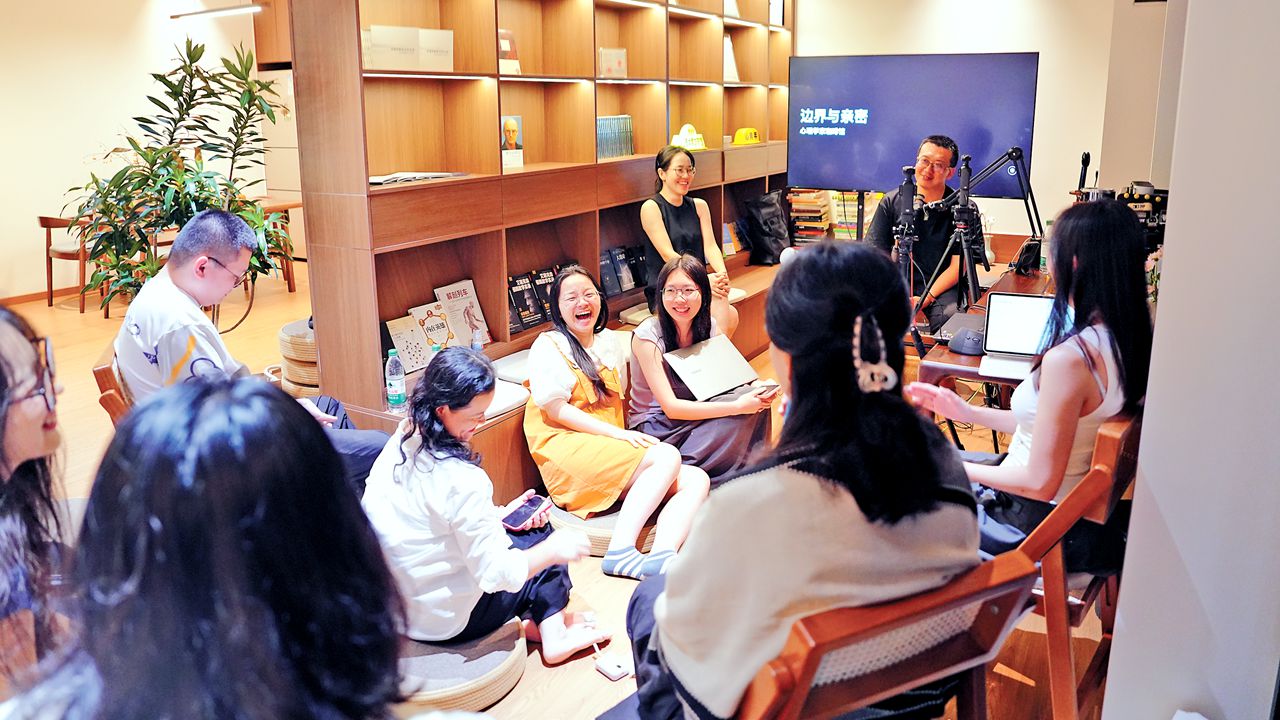
Participants react during a psychological salon at Temple of Love in September 2024.
For those who are entering the psychological counseling room for the first time, it is imperative to begin by clarifying the purpose of the counseling, according to Tao Xiangrong, a psychiatrist at Shenzhen Mental Health Center (Shenzhen Kang-ning Hospital).
“Choosing a suitable consultant is a vital step in the counseling journey,” Tao said. When selecting a counselor, it is important to consider their professional qualifications, consulting style, and area of expertise.
Finally, active participation in the consultation process is essential for its success. This means being fully engaged in the sessions, sharing thoughts and feelings honestly, and maintaining patience throughout the process, Tao suggested.